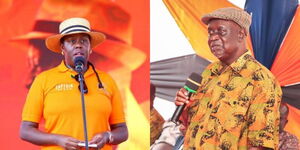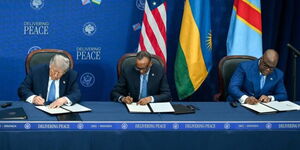The ongoing negotiations between President William Ruto and Azimio leader Raila Odinga are expected to take a new twist with United States Senator Chris Coons, who brokered the handshake deal in 2018, set to return to engage with the opposition.
Coons, the Delaware Senator credited with convincing Raila and former President Uhuru Kenyatta to enter the gentleman's agreement in March 2018, will meet Raila on Sunday, August 13, ahead of the bipartisan talks set to be held the following day.
The Democratic Party politician will be returning to Kenya for the third time since the 2022 General Elections. Coons met Raila and Uhuru separately in March this year and President Ruto on August 18, 2022.
It is unclear whether he will sit down with President Ruto in a separate meeting before he departs the country after this month's meeting with Raila.
Political analysts, nonetheless, opine that his presence amid the talks indicates a concerted effort from Western nations to exert pressure on both the government and the opposition, urging them to resolve their standoff.
Martin Andati, a government expert, explained to Kenyans.co.ke that the interest, especially of the White House, is multifaceted and driven by strategic, economic, and geopolitical factors that strive for the country's stability.
"Yes, the purpose is to ensure their interests are served politically, economically and in a military capacity. Kenya is very strategic, as we have a lot of investment opportunities."
"The West has a big interest and a lot is at stake in terms of bilateral trade opportunities so they would not want us to go down the route of Somalia and Sudan which is riddled with war," political analyst, Martin Andati, told Kenyans.co.ke
With the opposition's protests destabilising the nation, the US may have been at risk of losing a significant market for its exporters and a base for coordinating regional and continental politics.
As such, President Ruto may be forced to cede to Azimio's demands, including lowering the cost of living, reconstruction of the Independent Electoral and Boundaries Commission (IEBC), inclusion in national affairs, respect for political parties, and measures to curb police brutality.
This is despite Ruto, through Kenya Kwanza, demanding to discuss the implementation of two-thirds gender rule in Parliament, the inclusion of the Constituency Development Fund (CDF) in the Constitution, the creation of the office of the leader of the opposition as well as embedment of the office of the prime cabinet secretary.
Andati warned that Ruto would have to appeal to the West in order to continue enjoying the cordial relations he has had since August 2022, failure to which sanctions could be imposed, resulting in the country missing out on loans and grants - which are key for developmental projects.
"With the influence of the West, a strong opposition will be formed, meaning that issues concerning electoral reforms, also a position where Raila and (NARC-Kenya party leader) Martha Karua can sit on National Assembly and Senate. They can also come up with a post like the Prime Cabinet Secretary for (Wiper leader) Kalonzo Musyoka," Anadati opined.
"A shadow cabinet, which is paid by the exchequer, could be formed. It possibly consists of 22 individuals. It may not end up in a coalition government because Ruto becomes very hostile when it is mentioned," he added.
However, Ruto has enjoyed significant support from the West, which he has aligned with while strategically excluding China.
In previous rallies, Raila and his Azimio brigade accused foreign powers of supporting what they argued was an illegitimate government that overturned the people's will.
Foreign diplomats refuted the narrative but urged the opposition and the government to resolve their wrangles amicably. US Ambassador to Kenya, Meg Whitman, in a letter addressed to the White House, nonetheless, publicly backed Ruto's government to turn around Kenya's fortune.
With the US openly supporting Ruto, it may be perceived that Senator Coons may have been sent to convince the opposition to relent in its demands and agree to a truce with Ruto.
Dr Jane Thuo, a lecturer at the University of Nairobi and a political analyst, concurred that the West consists of power brokers who influence a nation's governance. She explained that the power-play aligns with Western ideologies, which massages the egos of African leaders who need resources, peer review and recognition from the international community.
She emphasised the need for Ruto's administration to prioritise Kenyans' interests and ensure it implements the promises made during the campaign. On the other hand, she opined that the opposition should seek to remain relevant by advocating for real issues that affect Kenyans and not seek a stake in the government.
"From the handshake, it didn't bring expected results whereby the opposition is working with government. I would hesitate to advise handshake. What needs to be done is to ensure we have a strong opposition that can be an alternative voice for the people," Dr Jane Thuo advised.












